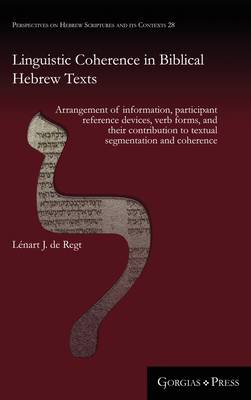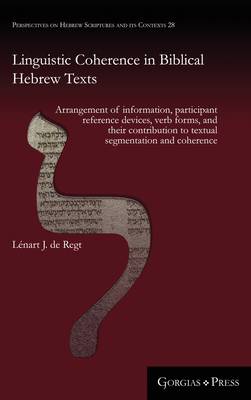
- Retrait gratuit dans votre magasin Club
- 7.000.000 titres dans notre catalogue
- Payer en toute sécurité
- Toujours un magasin près de chez vous
- Retrait gratuit dans votre magasin Club
- 7.000.000 titres dans notre catalogue
- Payer en toute sécurité
- Toujours un magasin près de chez vous
Linguistic Coherence in Biblical Hebrew Texts
Arrangement of information, participant reference devices, verb forms, and their contribution to textual segmentation and coherence
Lénart J de Regt
194,95 €
+ 389 points
Description
This monograph explores the various strategies that are used in Biblical Hebrew texts to create discourse coherence and comprehensibility: participant reference devices, the choice of verb forms, non-chronological arrangement, word order patterns, lexical cohesion and in general the balance of presupposed and unexpected information. It also provides a running commentary on the Balaam Pericope (Numbers 22-24) and its coherence. Many examples in the book illustrate how a thorough understanding of these devices of linguistic coherence beyond sentence level will help translators to preserve the coherence in translation. It is intended for hebraists, exegetes and close readers of Biblical Hebrew texts, as well as translators.
Spécifications
Parties prenantes
- Auteur(s) :
- Editeur:
Contenu
- Nombre de pages :
- 162
- Langue:
- Anglais
- Collection :
- Tome:
- n° 28
Caractéristiques
- EAN:
- 9781463239381
- Date de parution :
- 13-08-19
- Format:
- Livre relié
- Format numérique:
- Genaaid
- Dimensions :
- 152 mm x 229 mm
- Poids :
- 385 g







